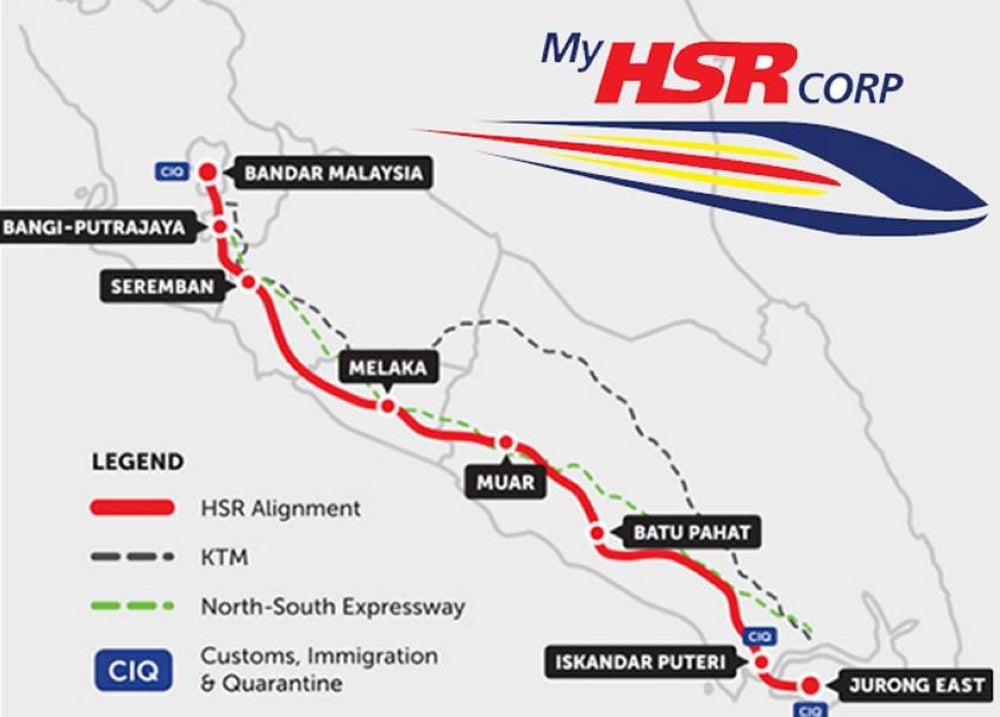No reason to bring back HSR project

SHAH ALAM - There is no need to revive the Kuala Lumpur (KL)-Singapore High-Speed Rail (HSR) project since there are already sufficient domestic and international public transportations.
Former deputy transport minister Datuk Kamarudin Jaffar said he was of the view that the government should not reinvest in the HSR project and instead focus and give priority to the country’s transportation hub.
“I think the HSR project should not be revived. Recently, the government approved the Subang Airport Regeneration Plan (SARP) to elevate the airport’s status as a regional aerospace and aviation hub. So now we have two major airports in KL.
“The government can pay attention towards improving the airports because we don’t want a situation where Malaysians would take a train to Singapore to board a flight there,” he told Sinar Premium.
The former foreign affairs minister said the HSR project will only add on to the government’s commitment and it would be a large investment for the country.
“The government will be forced to cover the high costs. I think there is no need to invest in a train system to Singapore.
“I think with the Johor-KL and the Subang Airport-Kuala Lumpur International Airport (KLIA) route available, the transportation needs in the country to Singapore is sufficient,” he said.
He was commenting on Singaporean Second Foreign Affairs Minister Dr Mohamad Maliki Osman’s statement that the republic would look at any proposals by Malaysia if Malaysia wanted to revive the project.
The railway project to link Kuala Lumpur to Singapore via a high-speed rail line was first proposed by then prime minister Datuk Seri Najib Razak in 2010.
However, the grand plan to cut travel time between Singapore and Malaysia from four hours by car to 90 minutes came to a halt on Jan 1, 2021 when both countries jointly announced the project’s termination.
This was after both countries failed to reach an agreement on changes proposed by Malaysia before the agreement of the project which involved 350 kilometres of development, lapsed on Dec 31, 2020.
In fact, Malaysia paid SG$102.8 million (RM320.27 million) to Singapore for the cost incurred involving the development of the HSR project as well as the extension of its postponement.
Economist Dr Nungsari Ahmad Radhi agreed that HSR should not be revived when Malaysia was facing economic constraints.
“The question is whether the project is a need and whether Malaysia is capable of implementing it? We have faced severe fiscal constraints with a continuous 22-year deficit in addition to the declining percentage of Gross Domestic Product (GDP).
“The government’s debt is almost RM1.5 trillion making us unable to add additional debts to the country. It is better to find a way to use the physical resources we have for different purposes,” he said.
Nungsari said the Electric Train Service (ETS) was sufficient and the government should improve its services,
“We have the ETS and we have spent billions of ringgit for its services. The government should increase its usage instead of providing additional highways or the HSR.
“The focus should be given towards completing the Gemas-Johor Electrified Double-Tracking project and the Rapid Transit System (RTS) Link project connecting Johor Bahru to Singapore,” he said.
Meanwhile, economist Professor Datuk Dr Shazali Abu Mansor said the HSR project could be a catalyst in restoring the tourism sector, investment and diplomatic relations with the neighbouring country.
“Our country’s economy has changed. It might have been wise to terminate it (HSR) due to political and economic pressure back then.
“However, in this digital era, I think there is a need to revive the HSR project to increase the ties between both countries.
“I view that HSR would provide many economic benefits in terms of tourism, transportation hub and to attract the interests of Singaporean investors in Malaysia,” he said.
He added that this would be a golden opportunity for Malaysia to be at the same level as other developed countries so that it would not fall behind in the development of the high-speed rail with international standards.














